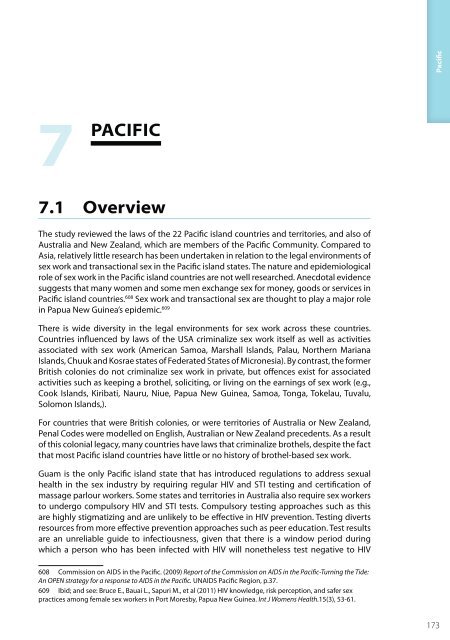SEX WORK AND THE LAW - HIV/AIDS Data Hub
SEX WORK AND THE LAW - HIV/AIDS Data Hub
SEX WORK AND THE LAW - HIV/AIDS Data Hub
Create successful ePaper yourself
Turn your PDF publications into a flip-book with our unique Google optimized e-Paper software.
Pacific<br />
7<br />
PACIFIC<br />
7.1 Overview<br />
The study reviewed the laws of the 22 Pacific island countries and territories, and also of<br />
Australia and New Zealand, which are members of the Pacific Community. Compared to<br />
Asia, relatively little research has been undertaken in relation to the legal environments of<br />
sex work and transactional sex in the Pacific island states. The nature and epidemiological<br />
role of sex work in the Pacific island countries are not well researched. Anecdotal evidence<br />
suggests that many women and some men exchange sex for money, goods or services in<br />
Pacific island countries. 608 Sex work and transactional sex are thought to play a major role<br />
in Papua New Guinea’s epidemic. 609<br />
There is wide diversity in the legal environments for sex work across these countries.<br />
Countries influenced by laws of the USA criminalize sex work itself as well as activities<br />
associated with sex work (American Samoa, Marshall Islands, Palau, Northern Mariana<br />
Islands, Chuuk and Kosrae states of Federated States of Micronesia). By contrast, the former<br />
British colonies do not criminalize sex work in private, but offences exist for associated<br />
activities such as keeping a brothel, soliciting, or living on the earnings of sex work (e.g.,<br />
Cook Islands, Kiribati, Nauru, Niue, Papua New Guinea, Samoa, Tonga, Tokelau, Tuvalu,<br />
Solomon Islands,).<br />
For countries that were British colonies, or were territories of Australia or New Zealand,<br />
Penal Codes were modelled on English, Australian or New Zealand precedents. As a result<br />
of this colonial legacy, many countries have laws that criminalize brothels, despite the fact<br />
that most Pacific island countries have little or no history of brothel-based sex work.<br />
Guam is the only Pacific island state that has introduced regulations to address sexual<br />
health in the sex industry by requiring regular <strong>HIV</strong> and STI testing and certification of<br />
massage parlour workers. Some states and territories in Australia also require sex workers<br />
to undergo compulsory <strong>HIV</strong> and STI tests. Compulsory testing approaches such as this<br />
are highly stigmatizing and are unlikely to be effective in <strong>HIV</strong> prevention. Testing diverts<br />
resources from more effective prevention approaches such as peer education. Test results<br />
are an unreliable guide to infectiousness, given that there is a window period during<br />
which a person who has been infected with <strong>HIV</strong> will nonetheless test negative to <strong>HIV</strong><br />
608 Commission on <strong>AIDS</strong> in the Pacific. (2009) Report of the Commission on <strong>AIDS</strong> in the Pacific-Turning the Tide:<br />
An OPEN strategy for a response to <strong>AIDS</strong> in the Pacific. UN<strong>AIDS</strong> Pacific Region, p.37.<br />
609 Ibid; and see: Bruce E., Bauai L., Sapuri M., et al (2011) <strong>HIV</strong> knowledge, risk perception, and safer sex<br />
practices among female sex workers in Port Moresby, Papua New Guinea. Int J Womens Health.15(3), 53-61.<br />
173
















